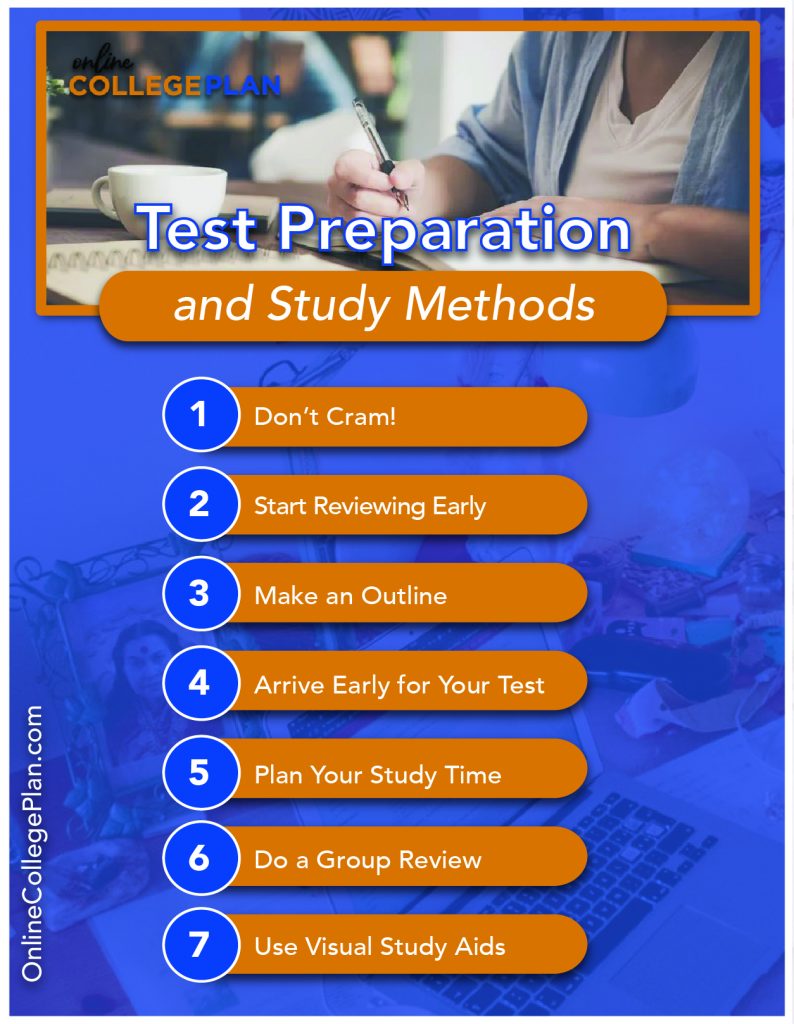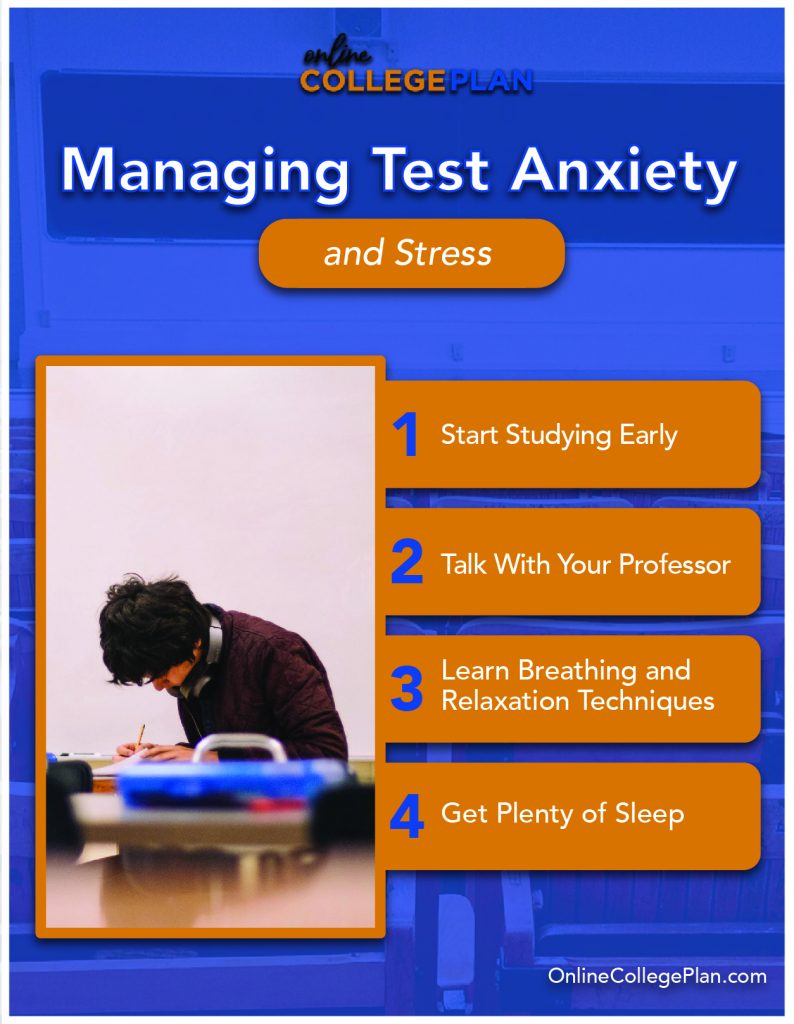A College Student’s Guide to Test Preparation
Find your degree

College can be a stressful time for many students. The tests required to excel in college are nothing like the ones you will have taken in high school, and much more studying and focus are needed to perform well on college-level exams. Depending on your major and the kind of coursework you enroll in, you might have tests every few weeks or even every week. Preparing for them and studying well are essential parts of your college career, and knowing how to prepare for tests adequately will save you a lot of time and stress in the long run.
You May Also Like: Top 100 Best Online Colleges
In this article, we will be discussing the best ways to study and prepare for your exams, the best test-taking strategies, and how to beat test anxiety. If you have had trouble with test-taking in the past, this information should boost your confidence and equip you with some new tools.

What Kinds of Tests Will You Have To Take in College?
In high school, you probably took many exams that focused on memorizing specific dates, events, or material. While high school tests are typically concentrated on recalling things from memory, college exams are often based on using your critical thinking skills to apply the knowledge that you have learned. In addition, some college courses might only have two or three exams during the semester, and these exams can cover vast amounts of information. College exams can consist of short essays, multiple-choice questions, short answer questions, or even oral exam portions.
See Also: Hacking It: Study Hacks for Online College Students
Why Is It Important To Prepare for Tests?
Being well-prepared for a test is pretty much the only way to ensure that you will not only get a good grade on the exam but in the class as a whole. Since college exams usually count more than high school tests, they are much more devastating to your overall grade when you do not do well. Performing well on major exams allows you to have a little more slack for smaller assignments. Plus, passing them with excellent grades ensures that you have a solid grasp of the course material.
What Are Some Test Preparation/Study Methods?

In the following section, we will go over some of the best methods for preparing and studying for your exams in college. Studying is a very different process for each person, so don’t take any of these approaches too seriously. Instead, practice studying with each method to determine what works the best for you. Overall, it can help if you always remember to study thoughtfully and not let yourself be consumed by stress over the material you’re learning.
Don’t Procrastinate or Cram
It’s never a good idea to procrastinate studying until the night before or even the week before your exam. “Cramming,” or trying to learn a lot of the material in a one-night, last-minute study session, is something that never works the way you want it to. You will never retain an appropriate amount of information by studying this way, and you will likely just feel overloaded, overwhelmed, and exhausted by the time you actually take your exam.
Start Reviewing Early
In order to not procrastinate or cram for an exam, it’s always best to start reviewing your material and studying early. Ideally, it would be best if you were studying on a weekly basis using your notes to review the previous week’s material from class. This might seem like a lot of learning, and it’s essential to understand that in college, life gets busy, and this may not work for you every week. However, make sure you are at least checking in with your course material every week to retain it effectively.
Make an Outline

Before an exam, you should outline the general topics and ideas you have gone over in that particular unit or section of the semester. Write down as much as you can remember off-hand from these topics and branch off from there with your study materials. Things that you forget to write down from memory can be great points to focus on with your studying. Once you outline the general topics you’ve covered, you will feel more comfortable with what the exam is covering.
Arrive Early
Don’t add more stress to your test preparation by making logistical errors. On the day of your test, make sure you leave with plenty of time to arrive at your test location and find a good place to sit. Before your test even begins, take time to practice relaxation techniques and take some deep breaths to reduce any pre-test stress you might have. Allowing yourself to focus before the test even begins makes you even more receptive to any possible hints or instructions from your professor.
Plan Your Study Time
Don’t leave studying to the last minute. Make sure that, whether it’s on your digital calendar, physical calendar, or in your class schedule, you allot specific time for studying. Giving yourself specific study times makes you more likely to stick to them rather than putting off studying until the very last minute. Plan on a particular block of time, a location, and a subject you are going to study to keep yourself in a productive direction. Aimlessly looking at your material doesn’t help anyone, so give yourself some structure.
Group Review
You might be nervous to talk to other people in your classes, especially if you don’t know them, but everyone is in the same boat as you! Everyone in your class is learning the same material, and your classmates can often be the best resource for making your studying count. Make a group chat with some of your classmates and plan on using the library, a study room, or even someone’s dorm for a group study session where you all review the material together. Bouncing ideas off one another can be one of the best ways to retain information.
Use Visual Study Aids
Some people are distinctly visual learners, and hearing auditory cues may not help them retain the material. If this sounds like you, visuals like diagrams, graphs, or charts can help you organize the course material in new ways to help you remember it better. For visual learners, being able to actually picture their study materials in their minds when taking a test can make it much easier to recall information they’ve learned.
Related: The Science of Learning and Education

What Are Some Test-Taking Strategies?
Perhaps just as important as your studying techniques are your test-taking strategies. These are techniques that you use during your actual exam to make sure you are making the best possible choices and answering questions to the best of your ability. It’s easy to forget what you’ve studied during the actual exam itself, so using these test-taking strategies can help you make the most of the limited time you have to answer questions. In addition, college exams are typically closely timed, so understanding that things are time-sensitive is one of the best things you can do for your exam.
Listen Carefully to the Instructions
Before the exam officially begins, your professor might offer some last-minute words of wisdom (including hints or helpful information). They will also likely give you directions on the test’s basic format (how the questions and answers are structured). Listen very carefully to these instructions, as they could give you hints for scoring higher on the exam. Your professor knows the exam much better than you, so listening to them will definitely help you score better.
Read Test Directions Closely
Similar to listening to your professor closely, there will likely be written directions at the beginning of your exam that you should pay close attention to. If you rush into answering questions and fail to read all of the directions effectively, you could miss essential information that will prevent you from answering the questions thoroughly. The test directions will also usually reiterate your time constraints, so they are vital to pay close attention to.
Do a Memory Dump
Writing down a memory dump is especially relevant for math and science exams, primarily ones where you will need formulas or equations to do well. As soon as the test begins, use either the back or margins of the page to write down as much relevant information about the material as you can remember, especially material you think you will need to use multiple times throughout the exam. If you are doing a calculus or physics exam, for example, give yourself a mini formula sheet at the beginning of the exam by writing down as many as you can remember.
Plan Your Time Wisely
As mentioned earlier, most college examinations are strictly timed, and you will not be allotted any room beyond that. That being said, planning out how to use your time effectively is incredibly important for taking a test. If there are multiple sections with different types of questions, the first thing you should do when starting the test is deciding how much time you’re going to spend on each section or question. Try to keep as closely as possible to these time guides and always keep your eye on the clock.
Answer Every Question
Likely, you won’t know or feel confident about the answer to every single question on an exam. It’s completely normal to get some questions wrong or be unsure about others. However, what isn’t smart is to ignore questions you don’t know the answer to. Even if you answer a question completely wrong, you are more likely to get some points for answering it than if you leave it completely blank. Because of this, answer every question on the exam, even if you aren’t confident that your answer is correct.
Find Out as Much as You Can About the Test Beforehand
In college, most professors have office hours where you can visit and talk with them personally before tests and exams. During these office hours, you can ask professors questions about the course material, how best to study, and what the exam will be like. While there are some questions your professor probably won’t want to answer, they are there to help you and will likely give you more information than you think. Professors appreciate it when you utilize their office hours, so be sure to make it a priority.
Use the Same Materials to Study
If you used a specific set of pens, pencils, or highlighters while studying for an exam, try to use these exact materials during your actual test. People retain information in different ways, and using the same materials can form an association. This can help you recall some of the things you studied that you may not have remembered.
See Also: Planning for your First Year in College

What Are the Best Ways To Take Notes in Class?
Before you even get to studying for an exam, you’ll need to take class notes. If your class is lecture-based, taking notes might be the only way to record and review material before exams. As soon as your professor starts talking in class, you should be taking notes on what they say and the material they are presenting. Don’t just take notes randomly, however. Note-taking techniques are essential for retaining the material, so we will be going over some of the most helpful ones in this next section. Not all of these will work for you, but test them out to see which ones do.
Take Notes in Outline Form
You cannot possibly expect to take notes on every detail of a lecture or lesson. You should, however, be paying attention to each concept and topic the professor goes over by writing your notes down in outline form. Getting a general idea of everything they teach is more important than getting every minor point. For this reason, be sure to look at the big picture while taking notes instead of getting caught up in the details.
Abbreviate and Simplify
Notes need to happen quickly during class, so you likely won’t have time to write down entire sentences or thoughts. To get the point across and make your notes easy to review, you should simplify and abbreviate concepts to the best of your ability. Use abbreviations you can remember and understand later, giving yourself cues for when you can’t write down everything that’s being said.
Make Your Notes Easy to Read
Similar to the concept of abbreviating and simplifying your notes, making them easy to read will only help you later on in your studying and test preparation. If you are sloppy or write too quickly, your notes will be rendered useless because you won’t be able to read them later on. Additionally, if you have to sort through and translate what you wrote, you will lose precious studying time. It’s easier just to take simple notes from the start, so keep this in mind while you are in class.
Compare Notes With Classmates
If you are close with any of your classmates, ask them if you can compare notes and see how similar they are. Chances are, you have probably caught something that your classmate didn’t notice, and vice versa. Comparing and revising notes is a mutually beneficial practice that allows you both to have a more comprehensive understanding of the material being discussed.
Review and Edit Your Notes
After class, when the speed of a lecture doesn’t constrain you, go through and review your notes to see if there is anything you missed or if anything is unclear. Doing this immediately after class will make you more likely to catch things and edit them to make them easier to read and review later as you get closer to your exam.
How Do You Deal With Test Anxiety or Stress?

If you have severe test anxiety, you might feel as though all of the studying and note-taking techniques you use become pointless once the test actually starts. Test anxiety can cause you to completely choke up and forget everything you’ve been working toward, which can be incredibly frustrating. This is especially true when you’ve put a lot of time and effort into studying the materials. However, there are some tried and true techniques to reduce test anxiety so that you feel less nervous and more prepared on the actual day of your exam.
You may also be interested in: 20 Effective Strategies For Dealing With Anxiety in College
Start Studying Early
Much of test anxiety comes from feeling unprepared, and there are always things you can do early in the semester to increase your preparedness. As mentioned earlier, it is always better to start studying at the beginning of the semester instead of cramming. Not only will this help you to retain more information, but it will also help you feel more confident on less stressed on test days.
Talk With Your Professor
Professors are there to help you, and many of them have likely dealt with test anxiety themselves. Express your concerns to your professor and let them know that you have difficulty with your nerves. They will probably try to ease your worries and offer you some information about the structure and format of the exam. This can also be a relief and may help you feel more prepared and knowledgeable on the day of the test.

Learn Breathing and Relaxation Techniques
Practicing mindfulness and restful breathing can help ease anxiety in any context, but it’s particularly helpful when it comes to test anxiety. If you arrive early enough for your exam, you can even practice these techniques in your seat a few minutes before the test begins.
Eat and Drink Water Beforehand
As humans, our brains work best when fueled with the things we need: whole, healthy foods and plenty of water. Have a light and healthy snack or meal around an hour before your exam, and be sure to stay hydrated throughout the entire day. This will ensure your brain is functioning at its best. While stressful studying might lead you to forget to eat, don’t neglect your nutrition, even during the most strenuous exams.
Get Plenty of Sleep
Food and water are essential for proper brain function, but so is sleep! Don’t stay up all night cramming for an exam the night before because this will leave you restless and exhausted during your actual test. You need to be well-rested before taking an exam, so be sure to get at least eight hours of sleep the night before a big test.
See Also: What Are The Best Study Habits For Undergraduates?
Conclusion
There are a lot of different aspects to studying and preparing for exams in college. As an incoming college student, you might become overwhelmed by just how different college exams are from high school exams. However, if you use the proper test preparation techniques, you will not need to stress yourself out over exams.
No test is worth losing sleep or food over, and one bad grade will not determine your future or your degree. Therefore, to do well on your exams, try out many different study methods to find the right ones for you and use them throughout all of your coursework!
Additional Resources:
- Important note-taking techniques for lecture-based courses.
- Exploring the cognitive science behind developing good study habits.
- Take this self-assessment to find out what your learning style is, and what study habits could work for you.
- Strategic studying resources from the University of California at Berkeley.
- Find out about the many different types of academic note-taking.
- Mindful guided meditations to help reduce test anxiety and stress.
- How to Study Videos – Stamford University has put together a wonderful collection of video series to help students get the most of their studies.
- A Research Guide for College Students – Covering everything from plagiarism, work cited, and formatting your research paper, this is the perfect guide for any college student who is writing a paper.
- Note-Taking Lined Paper Generator – If you need specific graph paper for taking notes, this Cornell note-taking lined paper generator can help you!
- 4tests.com – This free practice test website has practice exams for just about everything: from SAT practice tests to computer exams to every college subject you can imagine!
